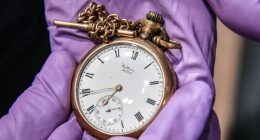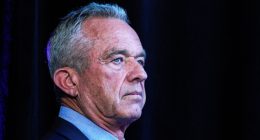FX on Hulu’s Reservation Dogs might have the most exciting cast of breakout performers of the year. Premiering in August, the darkly comic tale follows four teenagers growing up on a reservation in Oklahoma as they scheme their way — through minor crime sprees including hijacking a snack delivery truck and stealing copper — off the rez to sunny California in honor of their late friend Daniel, who aspired to head west to start anew. Leading the pack is Elora Danan, played with a quiet intensity by Devery Jacobs, who tells THR that she “needed to be a part of the show” when she first heard of the project created by Oscar winner Taika Waititi and showrunner Sterlin Harjo.
Told from a uniquely Native perspective, the series skewers cliches throughout its eight-episode first season — many of which originate from the ways in which white people have depicted Indigenous people in pop culture for a century. Jacobs and co-star Dallas Goldtooth, who plays a mischievous apparition named Spirit, spoke to THR about the underrecognized power of Indigenous storytelling, why humor can be such an effective healing mechanism and their excitement about joining the writers room for season two.
Sterlin Harjo has said he immediately bonded with Taika Waititi over their similar experiences despite being from very different parts of the world. Devery, you’re from Canada playing a character who lives on a reservation in Oklahoma. Is there a shorthand among Indigenous communities across the globe because of what you have in common?
DEVERY JACOBS One of the reasons [Watiti’s 2010 film] Boy is one of my favorite movies of all time is because [the characters] are all like family back home — except they all have Kiwi accents. There’s absolutely a commonality between us, which is something that ends up making Reservation Dogs so universal for Indigenous people across the globe. That said, we’re also comprised of many different languages and cultures and nations and territories. I grew up in Kahnawà:ke Mohawk Territory, which happened to be on the north side of this colonial border that split my nation in two. I also don’t necessarily consider myself to be Canadian or American — I consider myself to be Haudenosaunee. My nation is from both sides of this border.
The show also recontextualizes American pop culture in really interesting ways through a Native perspective.
DALLAS GOLDTOOTH We’re able to speak to a broader audience, but there’s a dual conversation happening here as we speak to folks within our own diaspora: “We see you, you’re a part of this, we’re building something together.” I love that the show is a conversation about culture — how communities, who are on the margins of society, take in culture, ingest it and make it a part of who they are. The name itself, Reservation Dogs, is obviously an homage to Reservoir Dogs. We didn’t grow up seeing Native content on TV. We saw pop culture on TV. And so we’re going to change that and make it our own.
JACOBS One of my favorite parts about being a part of the show is that it’s by Indigenous people for our communities, and everybody else also gets to be let in on the joke. That’s what ends up making it so specific and so funny. We’re not spoon-feeding white audiences, we’re not showing who we are in proximity to white people. [Many films] have shown us in Westerns or have shown us as people who only exist in contrast with white folks.
GOLDTOOTH We know how the outside world sees Native Americans. We are fully aware of that. And we’re going to take every opportunity to flip that on its head. There is an explicit aspiration to be a counter-narrative, but not to over-explain, as Devery said — not to explain it all, but to present something to make people think.
JACOBS One of the things with your character, Spirit, is that it’s holding a mirror up to Western audiences and challenging their ideas of what they think an Indian or Native American person looks like. There’s this ancient image of colonial contact with Native men, and then it’s flipping it on its head by Spirit being kind of … I don’t know, how would you want to describe him? He’s pretty goofy.
GOLDTOOTH He’s definitely very much a goofball. We’re dealing with dualities across the board here and also holding up a mirror to ourselves. We don’t have to keep jumping into the same mold of storytelling that has been dictated by white people. We can tell our own stories on our own terms, take control of these cliches and do with them as we wish.
Devery, your character also has some heavy moments — particularly when we learn she was the person to find Daniel after he died.
JACOBS One of the elements that rings most true to me throughout the series is the use of humor. [Before] shows like Reservation Dogs or [Peacock’s] Rutherford Falls, there were so few glimpses into Indigenous comedy and our biting gallows-type humor, the way we’re able to weave together heartbreaking and heartwarming moments. Growing up, my mom would always say, “If you don’t laugh, you’re going to cry.” And I think that’s so true to marginalized communities as a whole. I’m queer as well as Mohawk, and I think that’s also true of the queer community.
There’s serious shit that these kids are going through, and there’s real impact in context. Daniel’s story isn’t only a plot point on television, it’s the story from many of our families and communities. The issue of suicide affects Indigenous people at the highest rates [compared with] any other groups. It’s a fact of life for us. But it isn’t something that we’re sitting around feeling sorry for ourselves about. We’re incredibly resilient people. And one of the ways in which we are so resilient is through our humor.

Dallas, is that how you approach your comedy?
GOLDTOOTH I’m rife with insecurities, and comedy is a way for me to process that and really understand myself better. That is a form of healing. Maybe mainstream society overlooks the power of comedy as a healing mechanism, but for marginalized communities, comedy is a tremendous way to let go of trauma and move forward. We’re processing pain, we’re processing trauma of the past — we’re not hanging on to it. I think we wouldn’t be here as Native peoples if it weren’t for our ability to make light of a situation.
You’re both now writers on season two. I’m curious if you feel any pressure about speaking for a global Indigenous population and if that’s a conversation you’ve had in the writers room.
GOLDTOOTH Sterlin always emphasizes that we’re not going to get stuck into explaining identities. We’ll just say it as it is and let folks interpret it. There’s a lot of power behind that. We’re not dumbing it down for the audience — we’re encouraging the audience to be very critical and engage their mind on these things. This is a historical first in many ways, and so obviously there’s going to be a lot of pressure to hit all the notes. Each of us in that room brought a different aspect of Indian Country into that space, whether it’s urban, whether it’s Canadian, whether it’s First Nations, whether it’s on the rez. You see a broad perspective, even though it’s specifically in this one community.
Are you excited to write for your own characters, or is it more fun to think of things for your co-stars?
JACOBS Writing for the other characters is probably easier than writing for my own, because I feel so close to Elora Danan. I am incredibly grateful to Sterlin for embracing all of the writers of varying levels of experience and all being Indigenous from different communities. The whole reason that Reservation Dogs exists is because Taika Waititi opened the door to his peers and said, “Hey, let’s create a project together.” It wasn’t because there was a huge demand in the industry to pluck an Indigenous creative and uplift them so that they create their projects. It was from Indigenous peers helping each other out. Like Dallas said, hopefully this is the first of many — a whole industry of Indigenous creatives.
Interview edited for length and clarity.
This story first appeared in a November stand-alone issue of The Hollywood Reporter magazine. To receive the magazine, click here to subscribe.
Source: Hollywood







